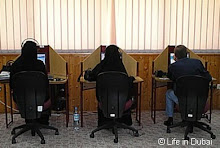People say that Dubai has no culture. I think it has, and that culture is working.
Trading. Doing business. Wheeling and dealing.
Location has always been a key. Added to that has been access and infrastructure. Dubai has always led the region in all three.
It's very much a working city. People come here to work, they work long and hard hours. It's all about working. Working is Dubai's DNA.
It's something I've talked about it in several previous posts, recently in response to gleeful 'Dubai crash' stories.
The fact is that Dubai always has been and always will be a trading centre, but that was all but forgotten in the mad property scramble.
It was madness.
Billions of dollars changed hands in spite of there being no laws governing the sector.
Speculators were allowed to flip properties, even without having made one payment, and made millions doing so. For the first two or three years it was all done not only with no laws in place but with no properties actually built.
Caught up in the madness too many senior executives went on huge ego trips. They announced more and more outlandish developments and they borrowed short term money to buy companies which would produce only long term returns.
Then the world hit the wall. Dubai is part of the world so we hit the wall too.
Not a bad thing, it was a runaway train out of control.
Huge, badly thought out developments have been halted. Many of the incompetent senior executives have gone.
But behind all that madness, unnoticed, was the trading Dubai. From the big merchant family conglomerates to the small and medium business which are so important to the economy, the trading went on. The world didn't comment because it didn't notice.
It's why the 'Dubai doomed' stories, the 'ghost town' predictions are wrong. The people writing them don't know Dubai's history. They think, indeed they say, that the city sprouted from the desert ten years ago. Before that it was just a small village they say. They think that property is what Dubai is all about.
They couldn't be more wrong.
Today's Gulf News has some stories talking about the real economy.
The lead story is that Dubai's non-oil direct exports jumped 23% in 2009 over 2008. The value of exports through Dubai Customs exit points in 2009 was Dh52.4 billion (US$14.25 billion).
The major product categories were valuable metals and products made from them, processed food products, plastics, rubber and natural metal products.
The top export markets were India, Switzerland, Saudi Arabia, Pakistan, Iran.
Another front page story says that passenger and cargo business at Dubai International Airport were way up in January over January last year. Passenger traffic was up 17% at 3.38 million, which was also a monthly record, beating the previous best of 3.81 million of December 2009.
Freight volume was up 31.5% over last January, at 171,453 tonnes.
The airport is now the world's fourth busiest for passenger traffic and fifth busiest for freight. Last year 40.9 million passengers used the airport.
A fourth Chinese airline, China Eastern from Yunan, also began flying into Dubai this week, so trade with the world's third largest economy should grow.
The new cruise ship terminal was also opened yesterday, in a joint inauguration with the cruise ship Costa Deliziosa.
The terminal, which can handle four ships simultaneously, is currently used by Costa Cruises, Royal Caribbean and Aida cruises. Last year there were eighty cruise ship calls to Port Rashid, bringing 263,000 passengers.
So there's plenty going on in the real world of Dubai's economy, as it always has.
Let's hope that lessons have been learned and in future the focus will be on Dubai's strengths.
The full stories:
Exports.
Airport.
Chinese airline
Cruise terminal.
Subscribe to:
Post Comments (Atom)






4 comments:
Well written. Agree on every detail. People have had this perception of Dubai Real Estate being the only industry here, due to the heavy marketing investment from this sector. But in reality, Dubai is not just about properties. But this property boom is also now showing its fruitful signs in other ways and perhaps in long term. Becoming affordable to lease office space, accommodation and the best infrastructure, lifestyle and regulations its proving again the best choice for companies to base their operations for this region. Best city to live in this region.
People often forget Dubai's real industries – aviation, trading, shopping, tourism, marine, re-export, media, wholesale, etc etc etc and property – one of them.
And precisely, we all often forget – Dubai is still work in progress. Rome was not built in one day, so will not Dubai.
It's very much a working city.
Can you give us an example of a "non-working city"?
What the airport article doesn't do is provide an indepth analysis on those numbers.
It would be interesting to see a breakdown of how many people actually stop in Dubai when using DXB.
We transited through last week from Frankfurt to Jakarta. Most people on our flight did not enter Dubai, but continued on to other destinations. The transit areas were packed with people from lots of different flights.
I think that DXB is becoming a hub between Asia and Europe for a lot of airlines.
In fact, the article does touch on this with the following quote, minus actual numbers:
"These gains result from Middle Eastern carriers taking a larger share of long-haul connecting traffic over their hubs," it said.
Post a Comment